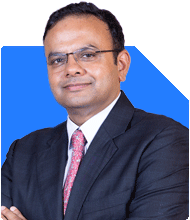66-Year-Old with Rs. 2 Crore FD Seeking Advice for a Comfortable Future
Ramalingam Kalirajan |10902 Answers |Ask -Follow
Mutual Funds, Financial Planning Expert - Answered on Jul 17, 2024
He has an MBA in finance from the University of Madras and is a certified financial planner.
He is the director and chief financial planner at Holistic Investment, a Chennai-based firm that offers financial planning and wealth management advice.... more

At present my age is 66 years and I have Rs.2 Cr in the form of FD. Cash in hand Rs. 4L. I have my own house to live. I have rental income Rs.50K per month. I have medical insurance of Rs.10 L. There is no liabilities of any kind. Kindly advise me for a comfortable peaceful life in future.
Fixed Deposits (FD)
Rs. 2 crore in FD ensures stability and regular interest income.
Cash in Hand
Rs. 4 lakh provides liquidity for emergencies.
Rental Income
Rs. 50,000 per month adds to your monthly cash flow.
Medical Insurance
Rs. 10 lakh cover offers some security against medical emergencies.
No Liabilities
Being debt-free allows you to focus on your financial planning without worry.
Assessing Your Financial Needs
Monthly Expenses
Calculate your average monthly expenses, including living costs and medical expenses.
Emergency Fund
Ensure you have 6-12 months of expenses readily available.
Investment Recommendations
Diversify Your Portfolio
Debt Funds: Invest a portion in debt funds for regular income and low risk.
Equity Mutual Funds: Consider a small portion in equity funds for growth.
Hybrid Funds: A mix of equity and debt provides balance and reduces risk.
Reduce Direct Fund Exposure
Direct funds lack professional guidance.
Regular Funds: Managed by professionals, ensuring better performance.
Tax Efficiency
Tax-Free Bonds: Consider tax-free bonds for steady, tax-efficient income.
Senior Citizen Savings Scheme (SCSS): Offers regular income and tax benefits.
Health and Medical Coverage
Increase Medical Insurance
Rs. 10 lakh may not be sufficient for major treatments.
Consider a top-up plan or super top-up insurance for additional cover.
Estate Planning
Will Preparation
Ensure you have a will in place to avoid legal complications.
Clearly state your wishes for asset distribution.
Nomination
Check and update nominations for all your financial assets.
Additional Income Streams
Monthly Income Plans (MIPs)
MIPs: Offer regular income and are suitable for retirees.
Provides a mix of debt and equity for balanced growth.
Systematic Withdrawal Plan (SWP)
SWP: From mutual funds, it allows you to withdraw a fixed amount regularly.
Provides regular income while keeping the principal invested.
Financial Advisory
Certified Financial Planner
Consult a Certified Financial Planner for personalized advice.
Regular reviews ensure your investments align with your goals.
Enjoying a Peaceful Life
Regular Health Check-ups
Prioritize your health with regular medical check-ups.
Stay active and maintain a healthy lifestyle.
Budgeting
Maintain a monthly budget to keep track of your expenses.
Ensure you live within your means to avoid financial stress.
Family Support
Communicate with family about your financial plans.
Ensure they are aware of your wishes and any important financial documents.
Final Insights
Diversify your investments to balance income and growth. Increase your medical insurance for better coverage. Ensure your estate planning is in place. Regularly review your financial plan with a Certified Financial Planner. Stay healthy and enjoy a peaceful, comfortable life.
Best Regards,
K. Ramalingam, MBA, CFP
Chief Financial Planner,
www.holisticinvestment.in
You may like to see similar questions and answers below
Abhishek Dev | Answer |Ask -Follow
Financial Planner - Answered on Aug 17, 2023
Ramalingam Kalirajan |10902 Answers |Ask -Follow
Mutual Funds, Financial Planning Expert - Answered on May 18, 2024
Ramalingam Kalirajan |10902 Answers |Ask -Follow
Mutual Funds, Financial Planning Expert - Answered on May 28, 2024
Ramalingam Kalirajan |10902 Answers |Ask -Follow
Mutual Funds, Financial Planning Expert - Answered on Jul 10, 2024
Ramalingam Kalirajan |10902 Answers |Ask -Follow
Mutual Funds, Financial Planning Expert - Answered on Jul 16, 2024
Samraat Jadhav |2514 Answers |Ask -Follow
Stock Market Expert - Answered on Dec 18, 2025
Reetika Sharma |432 Answers |Ask -Follow
Financial Planner, MF and Insurance Expert - Answered on Dec 18, 2025
Reetika Sharma |432 Answers |Ask -Follow
Financial Planner, MF and Insurance Expert - Answered on Dec 18, 2025
Reetika Sharma |432 Answers |Ask -Follow
Financial Planner, MF and Insurance Expert - Answered on Dec 18, 2025
Samraat Jadhav |2514 Answers |Ask -Follow
Stock Market Expert - Answered on Dec 18, 2025

Kanchan Rai |648 Answers |Ask -Follow
Relationships Expert, Mind Coach - Answered on Dec 18, 2025
Kanchan Rai |648 Answers |Ask -Follow
Relationships Expert, Mind Coach - Answered on Dec 18, 2025
Anu Krishna |1754 Answers |Ask -Follow
Relationships Expert, Mind Coach - Answered on Dec 18, 2025
Anu Krishna |1754 Answers |Ask -Follow
Relationships Expert, Mind Coach - Answered on Dec 18, 2025
Anu Krishna |1754 Answers |Ask -Follow
Relationships Expert, Mind Coach - Answered on Dec 18, 2025

























